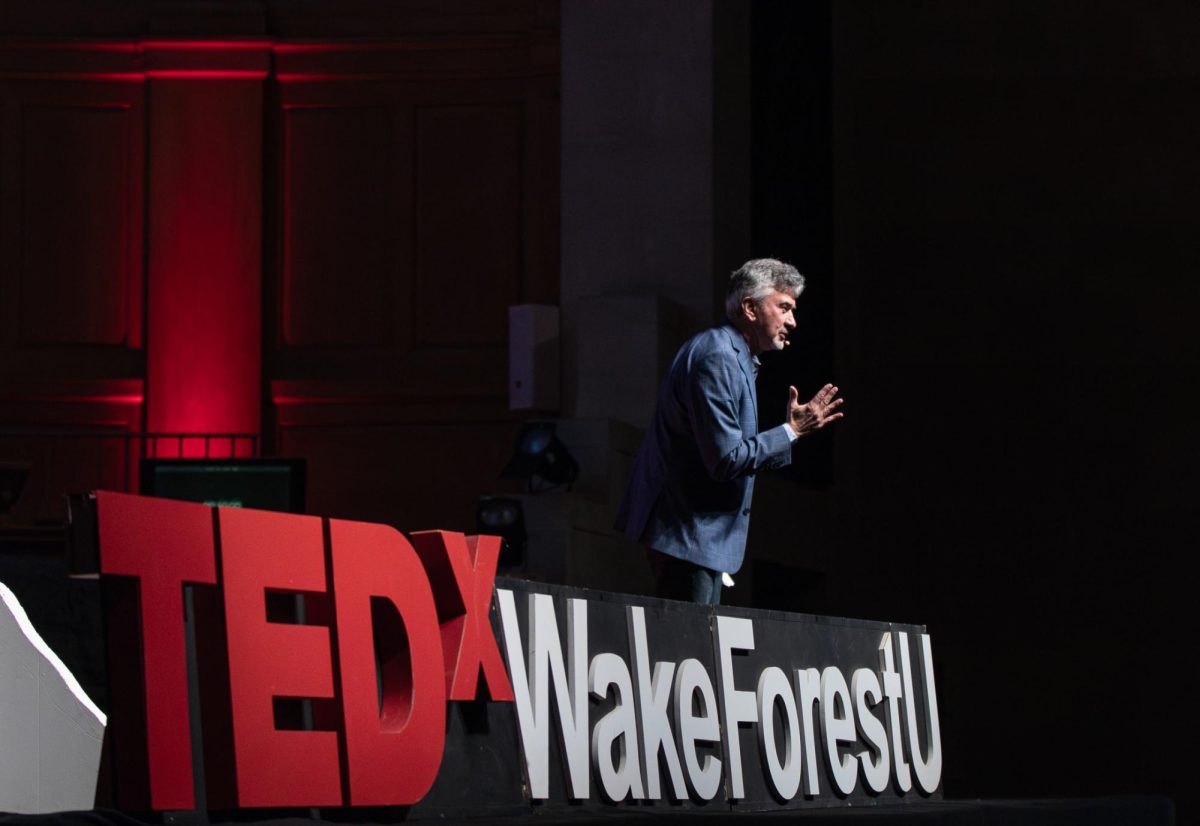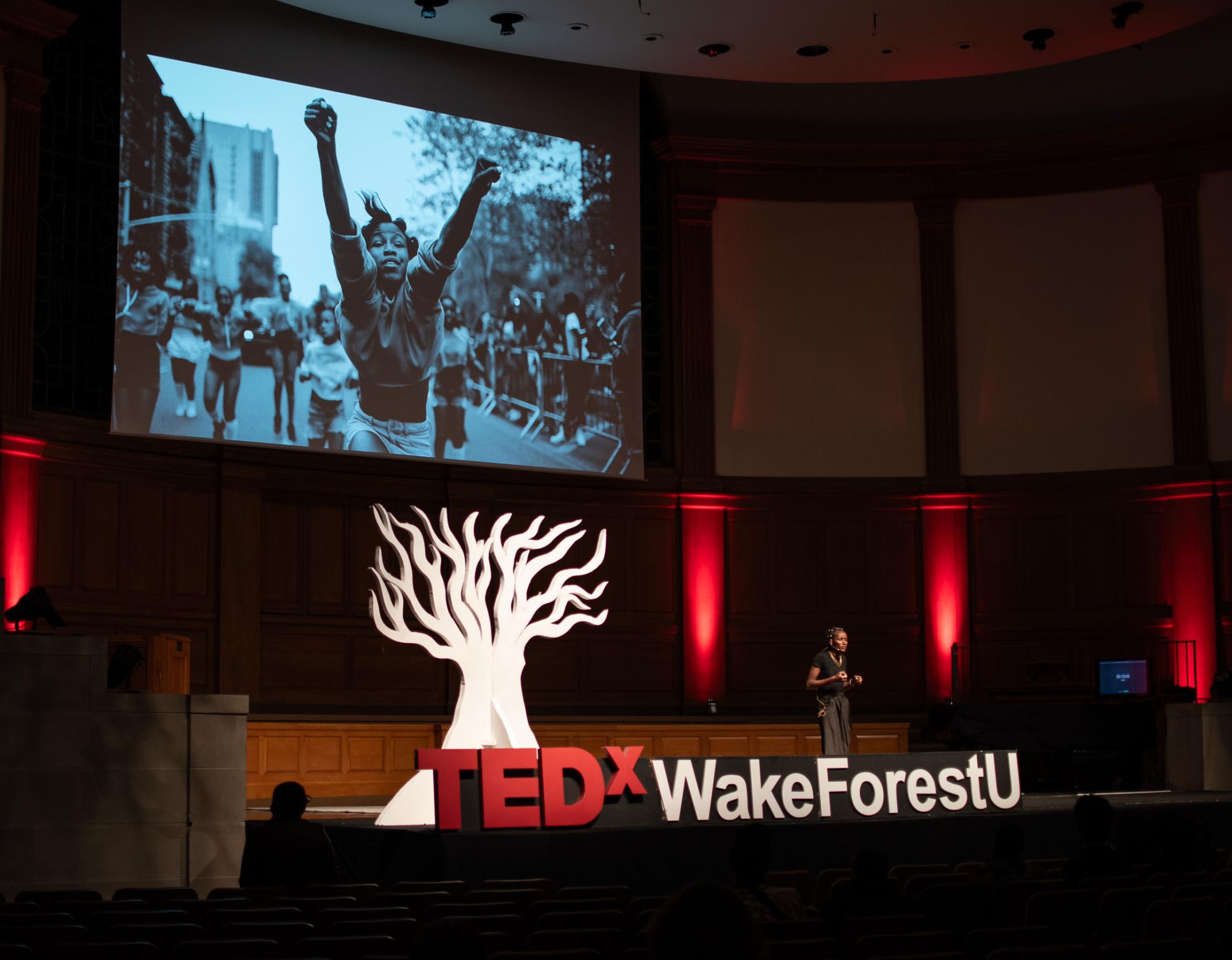TEDx Wake Forest hosted their annual event on Feb 8. This year’s event, themed, ‘Staying ConnecTED’, featured speakers who encouraged the audience to persevere, hold themselves accountable, reimagine history, be selfish and embrace learning.
The event, which took place in Wait Chapel, featured five innovative speakers who push boundaries in their respective fields, from photography to the legal system. Sophomore Chase Clark, director of events, said the diversity of speakers was intended to represent the range of interests present on Wake Forest’s campus.
“It was super important to be very intentional about the types of speakers that came in,” Clark said. “We wanted to make sure that the speakers were representative of the large and diverse community we have at Wake [Forest].”
The first speaker at the event was Florence “Flo” Ngala, a portrait photographer and photojournalist from New York. Her presentation, titled “Black Girl, White Ice,” detailed her life — from her origins as a first-generation American and figure-skater to her recent projects such as photographing the MET Gala. She reminded listeners that practice makes perseverance.
“Part of what I love about my job is observing people,” Ngala said. “Sometimes you can wait for the moment, and sometimes you can speak up about the moment. But the practice and the perseverance is what set me up to ask someone like Kim Kardashian to pose for a photo, or to ask someone like Erykah Badu to pose for a photo for me in the bathroom.”
Next, Griffin Spolansky, co-founder and CEO of Mezcla, a company that makes plant-based protein bars with unique flavors from ingredients around the world, spoke about the importance of accountability. He began Mezcla as an undergraduate student at the University of Virginia, managing his time between classes, the lacrosse team and the development of Mezcla bars. He stressed the importance of accountability even in day-to-day activities.
“If I don’t do something, I want someone to call me out,” Spolanksy said. “I want someone to push me to do better and to be better. I think accountability should stretch into all aspects of your life, too. You need to be accountable to yourself, and you need to be accountable to others.”
Shenarri Freeman then spoke about her experience as a chef, and how she has put a plant-based twist on soul food. She detailed the history of soul food, from its origins as food for mere survival during slavery, to the present-day version of soul food. Freeman said that while many hold the belief that all soul food is unhealthy, she hoped that her first restaurant Cadence would defy that misconception. The restaurant features vegan soul food and reimagines traditional soul food ingredients, such as okra.
“I think a lot of times when people think of soul food, it’s just fried,” Freeman said. “People just see it as unhealthy a lot of times, but through my platform and through my cooking, I’m able to share a different side of that.”
The fourth speaker, Steven David, spoke about how his work with the U.S. Army as a trial court judge in Indiana and as the chief defense counsel in Guantanamo Bay helped him develop his personal creed: “Work hard; do good; be proud; have fun; do what is right.” He encouraged listeners to be selfish as they develop their own personal creed and focus on maximizing their potential, rather than constantly comparing themselves to others.
“It’s okay to be a little selfish,” David said. “It’s okay to focus on yourself. Ask yourself: what is your personal creed? Are you taking advantage of everything that you have? Are you the best that you can be? Don’t worry about everybody else. Just be the best that you can be.”
Finally, Suresh Vishnubhatla, general manager of Chorus — Google X’s moonshot factory that aims to innovate goods around the world — explained the principles of radical innovation, which emphasized the importance of learning and included “aim for 10 times innovation, not 10 percent” and “fall in love with the problem, not the solution.” He also encouraged listeners to look for examples of systems that are not reaching their full potential, which could become ‘moonshot’ projects.
“Building something is fun. Running great experiments is fun. Learning is fun,” Vishnubhatla said. “ But if you cannot deliver value to whoever it is that you’re targeting that can use your product, it’s not that useful. Ask how valuable your product is, and learn from the answers you get from your experiments.”
Mia Bergier, junior and co-executive producer of TEDx emphasized that TEDx is important to the Wake Forest community because of the unique perspectives it provides.

“All of the speakers are coming from different backgrounds,” Bergier said. “They’re all coming from different career paths, and they can come and speak to us and to share their wisdom, what they’ve done and what they’ve been through. I think that’s something that’s really helpful for students to see and hear.”
Junior Nicole Tursellino said that she appreciated the variety of topics presented in TEDx.
“Something that I really enjoyed about attending the TEDx event was the way in which all five speakers were able to speak in such a compelling way about a variety of different topics,” Tursellino said. “I was able to learn about a diverse range of topics that I had not had much prior knowledge on, such as soul food.”
Junior Alexandra Ensrud said that along with the diversity, the speakers’ passion kept her engaged the entire event.
“I was blown away by the sheer amount of collective accomplishments of the five speakers,” Ensrud said. “When Flo Ngala took the stage, I was immediately enthralled. She was confident [and] funny, and her photos were breathtaking. I also appreciated the variety in scale of each topic, from single ingredients in soul food to how physical goods around the world are moved. Each speaker brought with them a clear message, good energy and a wealth of knowledge that I think everyone benefited from.”
Mary Klarer Fultz, senior and executive director of TEDx, said that TEDx hopes to expand outreach in the future and encourage students to find inspiration through the speakers’ stories.
“What we want TEDx to do is to further your knowledge, further your curiosity and keep you engaging in new material,” Fultz said. “College is a great time where you expand intellectually and socially, when you’re forming new connections with different people.”
She continued: “Our speakers tell stories you don’t hear everyday. We want people to walk away changed after hearing speakers they can connect with, and to think about what they’re going to do now that they learned these stories.”














